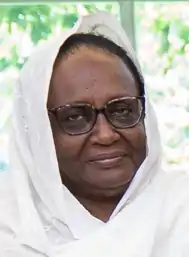Asma Mohamed Abdalla
Asma Mohamed Abdalla[3] (also: Asmaa, Abdallah, Abdullah;[4][5][2] Arabic: أسماء محمد عبد الله) is a Sudanese diplomat. She became Sudan's first female Minister of Foreign Affairs in early September 2019 in the Transitional Cabinet of Prime Minister Abdalla Hamdok, during the 2019 Sudanese transition to democracy.[4]
Asma Mohamed Abdalla | |
|---|---|
أسماء محمد عبد الله | |
 Asma Abdalla in 2019 | |
| Foreign Minister of Sudan[1] | |
| In office 1 September 2019[1] – 9 July 2020 | |
| Prime Minister | Abdalla Hamdok |
| Preceded by | al-Dirdiri Mohamed Ahmed |
| Succeeded by | Omar Ismail Gamar Aldin (acting) |
| Personal details | |
| Born | 1946 (age 74–75)[2] Khartoum, Anglo-Egyptian Sudan |
| Alma mater | University of Khartoum[2] |
| Occupation | diplomat |
 |
|---|
| This article is part of a series on the politics and government of Sudan |
|
|
Early life and education
Asma was born in 1946 in Khartoum.[6] She graduated in 1971 from the University of Khartoum after studying economics and political science.[2]
Diplomatic career
Asma was a Sudanese ambassador, employed by the Sudanese Ministry of Foreign Affairs, prior to the Omar al-Bashir presidency.[7] She was one of the first three women employed by the Foreign Ministry.[2][7] Asma was dismissed from the Ministry following the 1989 Sudanese coup d'état that brought Omar al-Bashir to power[8] and persecuted by the new government.[2]
According to UNICEF scanned paper records of 1990, Asma was Fourth Vice-Chairman of the UNICEF Executive Board during 1990/1991.[9]:5 A 2010 UNICEF list of the history of the UNICEF Executive Board disputes this, claiming that Chipo Zindoga from Zimbabwe was Fourth Vice-Chairman during 1990/1991 and 1991/1992 and that Asma was never a member of the UNICEF Executive Board, up to and including 2010.[10]
In response to her persecution by the al-Bashir government, Asma chose to live in exile in Morocco.[2] While living in Morocco, Asma worked as a consultant to international organisations including Islamic Educational, Scientific and Cultural Organization (ISESCO).[2]
2018–19 Sudanese protests
During the 2018–19 Sudanese protests, Asma joined the Forces of Freedom and Change (FFC), becoming a member of the FFC's Foreign Policy team.[2]
Minister of Foreign Affairs
Asma was added by Prime Minister Abdalla Hamdok to the list of candidate ministers provided to him by the FFC, on the grounds of her role in opposing the al-Bashir government, her support of the protests calling for political change, and her diplomatic experience.[2] Hamdok chose her ahead of the other candidates. Asma thus became Sudan's first female Minister of Foreign Affairs in early September 2019 in the Transitional Cabinet of the 2019 Sudanese transition to democracy.[4]
References
- "FFC, Hamdok reach deal on Sudan's transitional cabinet". Sudan Tribune. 4 September 2019. Archived from the original on 4 September 2019. Retrieved 5 September 2019.
- "أسماء عبدالله: فصلها البشير من العمل الدبلوماسي فعادت وزيرة للخارجية" [Asma Abdulla: sacked by al-Bashir from diplomatic work and returned as Foreign Minister]. BBC News (in Arabic). 6 September 2019. Archived from the original on 8 September 2019. Retrieved 8 September 2019.
- "Hamdouk approves several candidates for the transitional cabinet". Sudan Daily. 4 September 2019. Archived from the original on 4 September 2019. Retrieved 4 September 2019.
- "Prime Minister Hamdouk presents new Sudanese government". Radio Dabanga. 6 September 2019. Archived from the original on 6 September 2019. Retrieved 6 September 2019.
- Hendawi, Hamza (4 September 2019). "Women take prominent place in Sudanese politics as Abdalla Hamdok names cabinet". The National (Abu Dhabi). Archived from the original on 4 September 2019. Retrieved 5 September 2019.
- تعرّف على أسماء عبد الله أول امرأة على رأس خارجية السودان. aljazeera (in Arabic). 6 September 2019.
- "Could Sudan's new foreign minister be a woman?". The New Arab. 6 September 2019. Archived from the original on 6 September 2019. Retrieved 6 September 2019.
- "Hamdok announces first post-Bashir era government in Sudan". Sudan Tribune. 5 September 2019. Archived from the original on 6 September 2019. Retrieved 6 September 2019.
- "Attendance List – UNICEF Executive Board, New York – Special Session on the World Summit for Children – (6 and 7 September 1990)" (PDF). UNICEF Records, Archives and History. 24 September 1990. Archived (PDF) from the original on 6 September 2019. Retrieved 6 September 2019.
- "Officers of the UNICEF Executive Board since 1946" (PDF). UNICEF. 1 March 2010. Archived (PDF) from the original on 6 September 2019. Retrieved 6 September 2019.